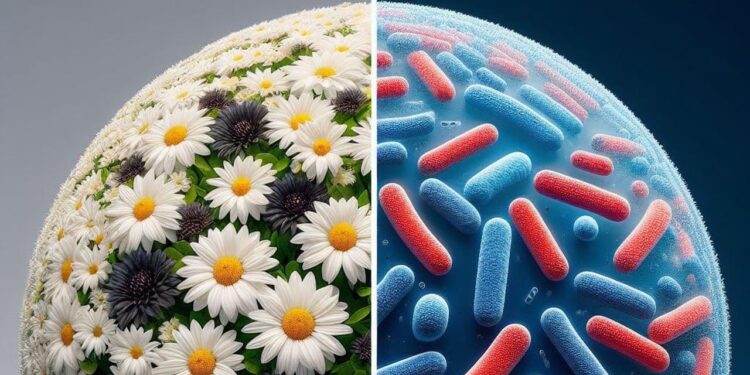A new paper proposes an experimental setup that could test the classic Daisyworld model – a hypothesis of a self-regulated planetary ecosystem – in the laboratory via two synthetic bacterial strains. Credit: Victor Maull, created with Image Designer
According to the Gaia hypothesis, proposed by scientists Lovelock and Margulis in the 1970s, our planet should have gradually warmed over millions of years, while our oceans should also have become progressively more acidic. The fact that this did not occur suggests the existence of a complex, planet-wide, self-regulating system in which planetary life and geological processes work together to stabilize planetary geology and climate. Despite its importance, this idea could not be tested before due to its planetary scale.
In an article published in the Journal of the Royal Society interface, external SFI professor Ricard Solé (Universitat Pompeu Fabra) and his collaborators propose an experimental system that will test, on a small scale, the dynamics that regulate planetary processes. Using synthetic biology, they will test two engineered microorganisms in a self-sustaining system to see if they can achieve a stable equilibrium.
This proposed configuration is inspired by recent fermentation research, which generally requires finely tuned external control, to achieve stable and regulated conditions, including a stable pH level. “Recent work has tried to see if we can engineer microorganisms for fermentation so that they can self-regulate,” Solé explains. “That was the main source of inspiration.”
This experimental setup, which Solé and several of his students developed during a visit to SFI, has the potential to answer long-standing questions in the field regarding global-scale regulatory systems.
In this experimental setup, one strain will detect if the environment is becoming too acidic and counteract the increase in acidity, while the other strain will detect if the environment is becoming too basic and will act to counteract this decrease in acidity.
“Because these strains act on the environment, and the environment affects them, it creates a closed causal loop,” Solé said. “The idea is to show that under very general conditions they will stabilize at a constant pH, as the original theory predicted.”
More information:
Victor Maull et al, A synthetic microbial Daisyworld: planetary regulation in the test tube, Journal of the Royal Society Interface (2024). DOI: 10.1098/rsif.2023.0585
Provided by the Santa Fe Institute
Quote: Life as a planetary regulator: researchers propose an experimental test (February 15, 2024) retrieved on February 15, 2024 from
This document is subject to copyright. Apart from fair use for private study or research purposes, no part may be reproduced without written permission. The content is provided for information only.



